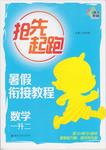题目内容
【题目】假定英语课上老师要求同桌之间交换修改作文,请你修改你同桌写的以下作文。文中共有10处语言错误,每句中最多有两处。错误涉及一个单词的增加、删除或修改。
增加:在缺词处加一个漏字符号(∧),并在其下面写出该加的词。
删除:把多余的词用斜线(\)划掉。
修改:在错的词下划一横线,并在该词下面写出修改后的词。
注意:1. 每处错误及其修改仅限一词;
2. 只允许修改10处,多者(从第11处起)不计分。
One night, I was on my home for my Christmas holiday when my car broke down. It was complete dead, and I was a few miles away from my home in that cold, wet night. I decided to walk around a little after accepting that I’d have to spend the night in the car. Maybe I can find a telephone. Actually, I didn’t have to walk far before I found the small house standing in a field with a light shone from the sitting room. I knocked the door was delighted when a pleasant old man opened the door and listened to my story carefully. He said he had no telephone and that it wasn’t any within walking distance, but the old man who offered to go to repair my car.
【答案】
【1】complete改为completely
【2】in改为on
【3】after改为before
【4】can改为could
【5】the改为a
【6】shone改为shining
【7】knocked后加at/ on
【8】was前加and
【9】it改为there
【10】who删掉
【解析】
试题分析:此类题型要求考查考生综合能力,包括句子理解、语法、时态等重点知识,难度偏难。
【1】complete改为completely,dead为形容词,意为“死气沉沉的;无生命的”,副词用来修饰形容词,故改为completely.
【2】in改为on. 考查介词的用法。at, in, on均可以表示时间,但又有区别。at表示时间的一点、时刻等,eg:at 9 o’clock ; at midnight. in表时间时,①某个较长的时间(如年、月、季节以及泛指的上午、下午等)内,eg:in 2015 ; in the morning. ②在一段时间之后,意为“在……以后”。eg: I will arrived in three hours. on表时间指,①具体的时日和一个特定的时间,如某日、星期几等。eg: on Monday ; on January 19th . ②表示在某个特定的早晨、下午或晚上。eg: He will arrive at 9 o’clock on the night of the fifth. 本题指出在那个特定的“湿冷的晚上”,故介词应用on.
【3】after改为before. 此题考查考生对句子的理解。句意:在接受在车内睡一晚上的事实前,我决定四处看看。从后文可知,“我”四处看看也许可以找到电话,说明作者并未接受在车子里过一夜的事实,而还保留希望,故应为before.
【4】can改为could. 全文时态为一般过去式,故此处can 要改为could.
【5】the改为a. 考查冠词的用法。特指用定冠词the,泛指用不定冠词a/an. 此题中“我”发现的那个小屋,上文中并未提及,可知此处为泛指,故改为a.
【6】shone改为shining. 此处考查复合结构“with+宾语+宾语补足语”,它在句中主要用作状语,表示伴随、原因、时间、条件、方式等;其中的宾语补足语可以是名词、形容词、副词、现在分词、过去分词、不定式、介词短语等。此处为with+宾语+过去分词/现在分词。当宾补为过去分词时,一般表完成或被动;当宾补为现在分词时,一般表进行或主动,此处光线照射应为主动,故为shining.
【7】knocked后加at/ on. 考查knock的用法。knock at/on为固定搭配,意为“敲,击,打”,eg: He knocked at the door and entered. 他敲了敲门便走了进去。
【8】was前加and. “I knocked the door was delighted…”此句有两个动词,故需要添加一个连词来连接两个完整的句子。由句意可知,两个句子的主语均为“I”,故添加“and”连接两个并列动词,则符合语法规则。
【9】it改为there. 考查there be句型。句意:在可以走到的范围内,没有一个电话。
【10】who删掉.“…but the old man who offered to go to repair my car.”but引导的分句中,只有一个动词,不需要定语从句,故去掉who,则是一个完整的句子。

 数学奥赛暑假天天练南京大学出版社系列答案
数学奥赛暑假天天练南京大学出版社系列答案 南大教辅抢先起跑暑假衔接教程南京大学出版社系列答案
南大教辅抢先起跑暑假衔接教程南京大学出版社系列答案